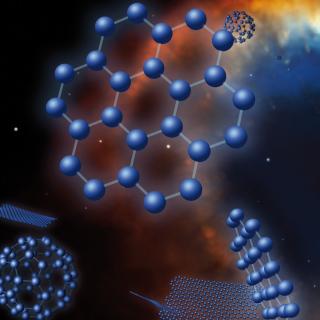Bibcode
García-Hernández, D. A.; Kameswara Rao, N.; Lambert, D. L.
Bibliographical reference
The Astrophysical Journal, Volume 773, Issue 2, article id. 107, 16 pp. (2013).
Advertised on:
8
2013
Journal
Citations
20
Refereed citations
20
Description
Residual Spitzer/Infrared Spectrograph spectra for a sample of 31 R
Coronae Borealis (RCB) stars are presented and discussed in terms of
narrow emission features superimposed on the quasi-blackbody continuous
infrared emission. A broad ~6-10 μm dust emission complex is seen in
the RCBs showing an extreme H-deficiency. A secondary and much weaker
~11.5-15 μm broad emission feature is detected in a few RCBs with the
strongest ~6-10 μm dust complex. The Spitzer infrared spectra reveal
for the first time the structure within the ~6-10 μm dust complex,
showing the presence of strong C-C stretching modes at ~6.3 and 8.1
μm as well as of other dust features at ~5.9, 6.9, and 7.3 μm,
which are attributable to amorphous carbonaceous solids with little or
no hydrogen. The few RCBs with only moderate H-deficiencies display the
classical "unidentified infrared bands (UIRs)" and mid-infrared features
from fullerene-related molecules. In general, the characteristics of the
RCB infrared emission features are not correlated with the stellar and
circumstellar properties, suggesting that the RCB dust features may not
be dependent on the present physical conditions around RCB stars. The
only exception seems to be the central wavelength of the 6.3 μm
feature, which is blueshifted in those RCBs showing also the UIRs, i.e.,
the RCBs with the smallest H deficiency.
Related projects

Nucleosynthesis and molecular processes in the late stages of Stellar Evolution
Low- to intermediate-mass (M < 8 solar masses, Ms) stars represent the majority of stars in the Cosmos. They finish their lives on the Asymptotic Giant Branch (AGB) - just before they form planetary nebulae (PNe) - where they experience complex nucleosynthetic and molecular processes. AGB stars are important contributors to the enrichment of the
Domingo Aníbal
García Hernández